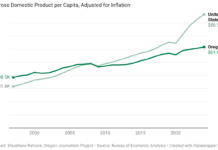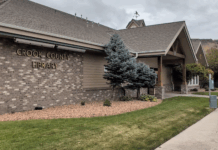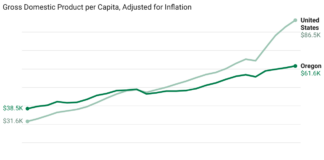
Prineville, Ore. – Following recent controversy surrounding the Crook County Fair Board’s improper use of executive session as part of a process to fill a vacancy on its board, the Fair Board on Monday (Nov. 4th) shockingly voted to defy the Crook County Board of Commissioners who directed the Fair Board to restart its process to recommend a candidate to fill the vacancy.
The appointment must ultimately be approved by the Crook County Board of Commissioners, though reportedly, the Board of Commissioners have historically appointed the Fair Board’s recommended nominee to fill a vacant seat.
Controversy Over the Oct. 17th Executive Session & Appointment Process
The issue occurred after the Prineville Review attended an earlier Oct. 17th meeting of the Fair Board. This publication initially attended the session believing it was a proper executive session to consider the employment of a new fairgrounds official. While members of the public can be prohibited from executive sessions, Oregon law requires members of the news media be allowed in most situations.
Immediately following the interviews and deliberations held in executive session on Oct. 17th, the board voted to recommend former Deschutes County Sheriff Larry Blanton to the Board of Commissioners for appointment to the boards vacant seat. The seat was previously held by Linda Smith whose term was set to expire at the end of 2024 and had apparently resigned from the position.
While the board did go back into a public meeting in order to hold the actual final vote, the board had also failed to make the meeting on Oct 17th available for remote attendance as required under the public meetings law (ORS 192.670). You can read our past report on this situation here.
Nov. 4th Special Meeting, Decision to Proceed, & Application Past the Deadline
During the Nov. 4th special meeting, Chair Gail Merritt, Vice Chair Mike Kasberger, Mike McCabe, and Casey Kaiser, all voted in favor of proceeding with their earlier decision to recommend their candidate to the commissioners.
The vote approved a motion made by Kasberger not to restart the selection process for the vacant board seat and proceed with its recommendation of Blanton to the Board of Commissioners. Kasberger is also the City of Prineville’s Assistant City Engineer.
Director Linda Cross chose to abstain from the vote as she was not party to the illegal executive session on Oct. 17th. Her comments deliberating on the issues were also brief and limited. Director Stanley Flynn, who was present at the Oct. 17th executive session, was absent.
Merritt and Kaiser’s vote in support of the decision was also a notable surprise, as the two appeared in opposition to Kasberger and McCabe, instead strongly indicating their belief the commissioners had made their position clear and that the process should be restarted.
“I feel like if we did mishandle that process — and we need to correct that — my hope would be that we can do that as quickly and efficiently as possible and get back to doing what it is that we’re all here to do, which is figuring out how to make the how to make the fairground better place, and how to pitch in and help out with stuff that we all like to help out with,” said Kaiser.
Merritt and Kaiser both did not return our requests seeking further comment and explanation for the shift in their position by voting in favor of Kasberger’s motion.
The Prineville Review also learned from the board’s discussions during the Nov. 4th special meeting that one of the candidates for the position had also submitted their application past the deadline.
Fairground staff confirmed to the Prineville Review on Tuesday that the late application was from Blanton, while also confirming the on-time application was from Steven. A fairground’s staffer told the Prineville Review that Blanton had originally sent his application to Board of Commissioner’s Executive Administrator Sarah Puerner within the deadline, but it was not received.
We have not been able to reach Blanton for comment or to see if he could provide confirmation that such an email was sent.
Merritt appeared to already be aware of the position of the commissioners prior to County Counsel Eric Blaine revealing the commissioners formal decision made during its own Oct 30th public meeting.
“We’ve been instructed not to turn in a letter of recommendation,” said Merritt.
She again referenced the commissioners’ instruction later in the meeting.
“So there is always the possibility to that if we don’t rescind and recommend the candidate that we selected, then the County Court [Board of Commissioners] may say ‘no’, they have final say,” Merritt stated.
“That’s correct,” Blaine replied.
Director Kasberger responded with a clear indication that the board should move forward with its recommendation despite learning that the Board of Commissioners directed them to start the process over before they consider any nominee for appointment.
“But aren’t we obligated to do what we think is right? Not what someone else is going to do?” Kasberger remarked.
Director Kaiser then asked further questions on what the commissioners might do if they proceeded with the recommendation and did not restart the process. That’s when Blaine finally revealed the commissioners’ Oct. 30th decision that at least some of the other directors appeared to have already been aware of.
“So my question was whether or not they [the commissioners] made that clear, and it sounds like the answer was no,” said Kaiser.
County Counsel Blaine then immediately confirmed that the answer was actually a “yes”, reading the statement he had been directed by the commissioners to provide to the Fair Board, but had not done so until over an hour into the meeting.
“On Oct. 30th, the commissioners asked me to send a message to the Fair Board members,” said Blaine, going on to read the following statement:
“At today’s meeting of the Crook County Board of Commissioners, the commissioners asked to forward their request that the Fair Board restart the process for the nominations to fill the vacancy in the Fair Board. This would involve a meeting formally rescinding any decision made on Oct. 17th regarding the recommendation to the Board of Commissioners, letting the two current candidates know that the process will be restarted from the beginning, creating a new deadline to submit applications — the normal time being a month, thirty days — advertising the vacancy and the opportunity to submit applications, receiving and reviewing those applications, conducting interviews, and preparing recommendations for the County Board of Commissioners,” Blaine read.
Merritt then expressed her belief that it indeed appeared the commissioners would not move forward without restarting the process. She then went on to ask the thoughts of Director McCabe (who is a also a former county commissioner).
“I think they want to start over. If they have anything to stand on, it’s starting over,” McCabe said.
“That’s meaning the commission, right– the Board of Commissioners?” asked Kasberger, to which McCabe confirmed.
“I don’t think they’re going to let us get by with this,” McCabe then remarked. “I think they were clear, or somewhat clear, that this is going to start over.”
Director McCabe went on to ask if Blaine could provide the Fair Board with training on Oregon’s public meetings laws. As of 2024, members of governing bodies in Oregon are now required to undergo formal training on the State’s meetings law during each term of office as well.
Fair Board Director Publicly Expresses Displeasure with County Commissioners
Director Kasberger then went on to express frustration with the commissioners’ decision for the Fair Board to restart the selection process.
“I still think it was totally improper for them to come up with that decision without talking to us first. There was no input from their advisory board, and that’s where I’m buzzed,” said Kasberger. “It is totally improper, and going over to to have my little conversation with them, and they won’t answer their door, I don’t like that one either — not one, not one bit.”
Kasberger claimed to have made four attempts on a single day last week to speak with the commissioners in person. He also went on to say during the meeting that he didn’t want to communicate with the commissioners by phone or email, but didn’t articulate why.
Had the commissioners jointly met to speak with the Fair Board as implied by Kasberger, it likely would have required notice of a public meeting. Under Oregon’s public meetings law, members of governing bodies must also avoid serial communications, an issue also explained to the Fair Board by Blaine. According to the Oregon Attorney General: “A governing body risks violating meetings law through a series of private communications, even if a quorum isn’t involved in any single communication.”
“We had a very good candidate, we were ready to recommend them to the county, and got to the County Commission, or County Board of Commissioners last week and it didn’t even come up for discussion — it was shot in the tank before we even started,” explained Kasberger.
While Kasberger claimed the need to appoint Blanton was “time sensitive” and necessary in contract negotiations with the Crooked River Round-up, it appears their decision not to restart the process could ultimately lead to even further delay than there would have been if the board had decided instead on Nov. 4th to restart the process.
“We can all understand we did not do correctly, buit I’ll tell you what, this board is not easy to be on. There’s a lot of work to it,” said Kasberger.
He went to express apparent frustration with the requirement for the meeting being public, or at least more accessible with remote appearance.
“And to get somebody to sit in this chair right here and volunteer to take that on is difficult, and then to turn it around and put it in front of the public on the TV — I don’t know I’d do it again, said Kasberger. “Like I said, you’ve [Blaine] have shown us that is the proper thing to do, but it’s getting more difficult with every day to get anybody to stand up,”
Vice Chair Kasberger declined to answer any questions seeking any clarification on his positions and why he made the motion in clear opposition to the commissioners’ direction on restarting the process before they consider a nomination. We also intended to ask Kasberger why Blanton could not be brought in as a volunteer advisor to assist with contract negotiations with the Round-up, even if he wasn’t yet a voting member of the board.
Commissioners Respond to Fair Boards Decision not to Restart the Selection Process
On Wednesday, all three county commissioners responded to requests for comment from the Prineville Review made early Tuesday on the Fair Board’s decision.
“I do not plan to vote in favor of the fair board’s recommendation. The commission voted unanimously to ask the fair board to restart the process of choosing a new board member,” said Commissioner Seth Crawford. “I truly appreciate the hard work the fair board puts in providing excellent facilities and events for our community but I believe that starting over the process of selecting a new fair board member will better serve the public’s interest.”
Commissioner Susan Hermreck’s response was brief and direct, while also explaining she had not been aware of the latest decision by the Fair Board. “I stand by the Board of Commissioners decision to start the process over,” Hermreck stated.
Commissioner Brian Barney responded with more detail, but said in part: “As you know, I wasn’t personally at the CCFB meetings and thus quartering [sic] backing the information that you have brought to our attention. I strongly align with our legal responsibility to adhere to the meeting laws and our obligation to be transparent to the public.”
Below was Barney’s response when asked if he would consider reversing the earlier decision requiring the Fair Board to restart the process:
“I believe this question is moot as Mr. Blanton, who has been a dedicated employee of the public would not want to serve under circumstances that are questionable. I know and respect each person on the CCFB and believe they won’t submit a request that contrary to requirements for which the commissioners can’t accept until process has been followed since they now have a better understanding.”
The response appeared to indicate that he was not aware the Fair Board voted Nov. 4th to proceed after having been informed of the commissioners earlier decision following their initial vote taken on Oct. 17th . We have since asked for further clarification from Commissioner Barney on the matter.
The Prineville Review’s Public Meetings Grievance
The decision on Nov. 4th was also in part to address a formal grievance filed by the Prineville Review for holding the Oct. 17th executive session and not making the meeting remotely accessible to the public.
The grievance is the first part a new process overseen by the Oregon Government Ethics Commission (OGEC). In early 2023, the Oregon legislature passed HB 2805 which provided a new process so public bodies an opportunity to respond to the grievance before the submitting party then decides if they wish to initiate a formal complaint to the OGEC for potential investigation.
Prior to the the law becoming effective in in September of last year, the public and media could only address public meetings law violations by submitting legal complaints in circuit court, complaints which are often costly and prohibitive.
The Fair Board had initially indicated that it was likely to use another executive session during its Nov. 4th meeting to discuss the issues surrounding its earlier illegal executive session, stating that the Prineville Review’s grievance amounted to “litigation likely to be filed”, allowing for executive session under ORS 192.660(2)(h).
This publication protested, outlining that the grievance process was not indication of litigation likely to be filed, even should the grievance expand to a formal complaint by the OGEC.
“A grievance submitted to the OGEC is far from an indication of litigation ‘likely to be filed’, especially by a complainant, and holding of an executive session would, on its face, be improper under ORS 192.660(2)(h),” this publication explained.
“Even so, should a formal complaint be initiated subsequent to the grievance with the OGEC, actions by the OGEC on violations would be against members of the governing body in their individual capacity, not against the governing or public body itself. Even if you considered that such action by the OGEC would meet the standard of litigation “likely to be filed”, county counsel likely could not represent the members of the governing body without violating ORS 244.040.”
Blaine’s had been the force recommending that the Fair Board use an executive session.
The Fair Board ultimately decided to proceed with its Nov. 4th meeting publicly, albeit with some initial dissent from Director McCabe, along with concerns from Director Kasberger. McCabe had also claimed (inaccurately) that the Prineville Review was threating legal action and it was unfair to address the Oct 17th public meetings violations publicly, but the claim of a lawsuit was later clarified to be incorrect.
Blaine also provided further clarification to McCabe and the other directors during the meeting about the grievance process and potential of review by the OGEC should a formal complaint be filed after the grievance response. Litigation between members of a governing body and the OGEC itself is possible should the OGEC take action upon the finding of a violation that the member moves to appeal through a legal complaint.
Kasberger also expressed that it was “ridiculous” that as volunteer board members they could be liable for violations of the meetings laws. His statement also appeared to tie volunteer hours unrelated to the time spent volunteering on the board.
The decision by the board appears to take action as outlined in ORS 192.705(C), which allows the governing body to admit to violations of the public meetings law, and “setting forth the steps the governing body will take to cure the violation,” or that it must proceed by “Acknowledging in a properly noticed and conducted public meeting held within 45 days of the governing body’s original decision that: (I The original decision was made in violation of ORS 192.610 to 192.705; (II) Good cause exists for the governing body to not rescind the decision; and (III) The governing body’s practices will be modified to ensure future violations of ORS 192.610 to 192.705 do not occur.”
Even so, the decision does not proceed in a manner supported by the Board of Commissioners who appear very intent on not considering filling the vacant Fair Board seat until the process is restarted, leading to the potential of even further delay in filling the vacancy.
A response from the Fair Board to the grievance is due before the end of today (Nov. 8th).
Public Notice Issues & Next Meeting of the Fair Board
The Fair Board had also failed to have the Nov. 4th meeting noticed on the county’s meetings website page, but it did provide direct notice to this publication. While it did use Zoom for the meeting, staff did not enable the video for itself (although doing so is not required by the meetings law).
We were not informed why it was not posted there after inquiring. Postings of every other regular and special meeting for the Fair Board in October and a future meeting in November appear on the page. The Oct. 31st special meeting online did not provide a remote access link, although upon our arrival the agenda handed to us included the remote meeting link.
The Fair Board’s next public meeting is scheduled for Nov. 18th at 5:30pm. Additional information and remote attendance links can be found here: https://co.crook.or.us/fairgrounds/page/november-2024-fair-board-meeting
Mr. Alderman is an investigative journalist specializing in government transparency, non-profit accountability, consumer protection, and is a subject matter expert on Oregon’s public records and meetings laws. As a former U.S. Army Military Police Officer, he brings a disciplined investigative approach to his reporting that has frequently exposed ethics violations, financial mismanagement, and transparency failures by public officials and agencies.





